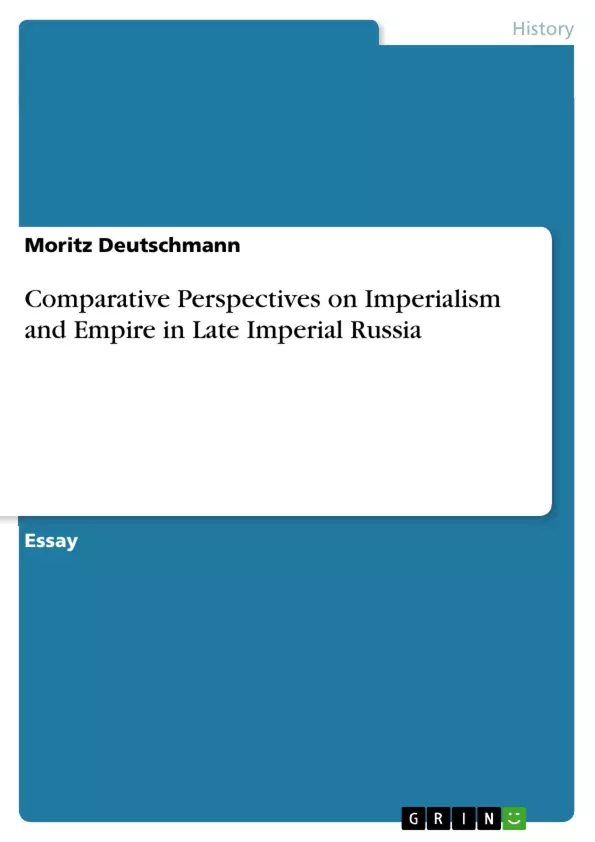There are few topics that have been as present in post-Soviet histories as empire and its aftermath. Tales of century-long Russia oppression have become core elements of many historical narratives in the former Soviet republics. In Western European scholarship concepts from imperial history and post-colonial studies have had a big influence on the historiography of Russia and the Soviet Union. However, these are recent phenomena: in most histories of Russia, written in Russia or the Soviet Union itself as well as in the West before 1991, empire has been left out to an astonishing degree. Only for the Soviet Union the so-called “nationality question” was a larger topic, appearing in Soviet praise for the “friendship of the peoples” or condemnation of “anti-Soviet nationalism” and “Great-Russian chauvinism”.
This essay picks up on some of these issues and looks at how various scholars interested in the imperial aspects of Russian history have put them into a comparative perspective. Although the number of works is still limited, especially compared to the huge number of studies on different Western European empires, it is possible to draw some general conclusions. This will also be helpful in considering to what extent Russian experiences could reflect back on more general theories of empire or post-colonial studies.
Inhaltsverzeichnis (Table of Contents)
- Comparative Perspectives on Imperialism and Empire in Late Imperial Russia
- Dietrich Geyer: Imperialism without Empire
- The Transformation Crisis
- The Role of Panslavism
- Witte and the Manchurian Expansion
- The Quest for Domestic Reform
- Shortcomings of Geyer's Comparative Framework
- Dominic Lieven: The Ubiquity of Empire
Zielsetzung und Themenschwerpunkte (Objectives and Key Themes)
This essay examines how various scholars have used comparative perspectives to analyze the imperial aspects of Russian history. While acknowledging the limited number of studies compared to those on Western European empires, it aims to draw general conclusions and explore the potential of Russian experiences to inform broader theories of empire and post-colonial studies.
- The Role of Imperialism in Russian Social and Political History
- Comparative Analysis of Russian Empire with Other Empires
- The Importance of Local Dynamics in Imperial Expansion
- The Relationship between Domestic Politics and Foreign Policy in Russia
- The Significance of "Empire" as a Specific Form of State
Zusammenfassung der Kapitel (Chapter Summaries)
- Comparative Perspectives on Imperialism and Empire in Late Imperial Russia: This introductory chapter sets the context by discussing the historical and historiographical significance of the Russian Empire. It explores the ongoing debate about Russian imperialism, highlighting the lack of extensive scholarship on this topic before 1991.
- Dietrich Geyer: Imperialism without Empire: This chapter focuses on the work of Dietrich Geyer, who attempted to apply theoretical models of imperialism developed for Western Europe to the Russian context. Geyer's approach emphasizes the “inner aspects of external affairs” and links imperial expansion to domestic social conflicts. The chapter analyzes Geyer's three-phase model of Russian imperialism, highlighting the tensions between domestic reform and foreign policy goals. It also discusses the limitations of his comparative framework, particularly its bias towards the nation-state model and its neglect of local dynamics.
- Dominic Lieven: The Ubiquity of Empire: This chapter examines the work of Dominic Lieven, who takes a more nuanced approach to empire, viewing it as a ubiquitous phenomenon rather than an exceptional case. The chapter explores Lieven's comparative analysis of the Russian Empire with the British, Ottoman, and Habsburg Empires. It highlights the potential of his approach to generate new insights into the Russian imperial experience and its international context.
Schlüsselwörter (Keywords)
The main keywords and focus topics of this text include Russian Empire, Imperialism, Comparative History, Post-Colonial Studies, Social History, Domestic Politics, Foreign Policy, Nation-State, Local Dynamics, Central Asia, Caucasus, Panslavism, Witte, Transformation Crisis.
Frequently Asked Questions
Why was the concept of "empire" neglected in older Russian histories?
Before 1991, both Soviet and Western historiography often left out the imperial aspect, focusing instead on "friendship of peoples" or class struggles, rather than viewing Russia as a colonial empire.
What is Dietrich Geyer's model of Russian imperialism?
Geyer proposed a three-phase model that links external expansion to domestic social conflicts and the "transformation crisis" of the late Tsarist state.
How does Dominic Lieven compare the Russian Empire to others?
Lieven views empire as a ubiquitous form of state and compares Russia with the British, Ottoman, and Habsburg Empires to find common patterns of power and decline.
What role did Panslavism play in Russian expansion?
Panslavism is discussed as an ideological factor that influenced foreign policy and domestic reform debates during the late imperial period.
Can Russian history inform modern post-colonial studies?
Yes, the essay explores how Russian experiences with continental colonialism can reflect back on and broaden general theories of post-colonialism.
What were the shortcomings of using Western models for Russian imperialism?
Scholars like Geyer were criticized for a bias toward the nation-state model and for neglecting specific local dynamics in regions like Central Asia and the Caucasus.
- Quote paper
- Moritz Deutschmann (Author), 2009, Comparative Perspectives on Imperialism and Empire in Late Imperial Russia, Munich, GRIN Verlag, https://www.grin.com/document/163885



